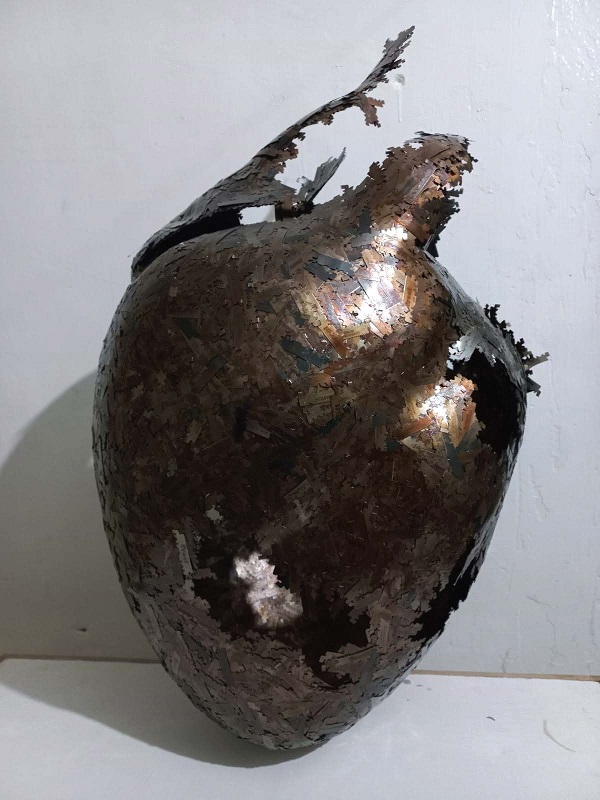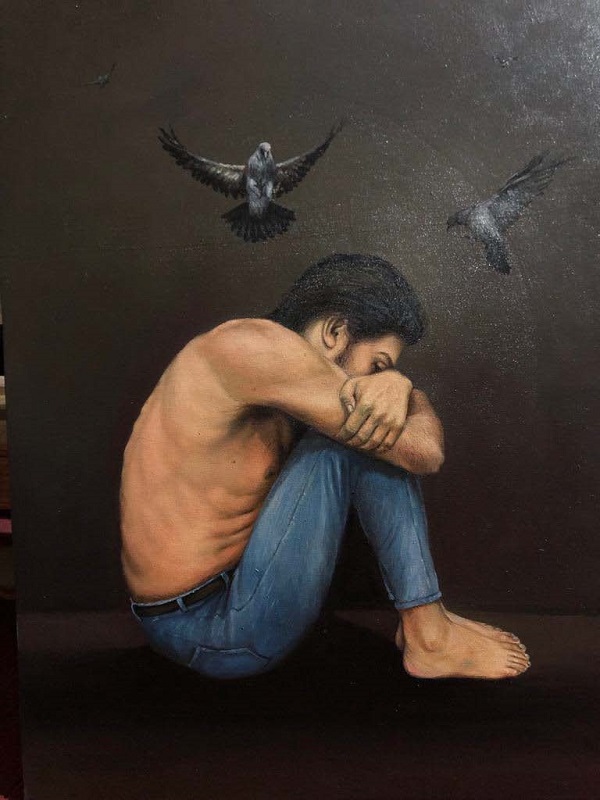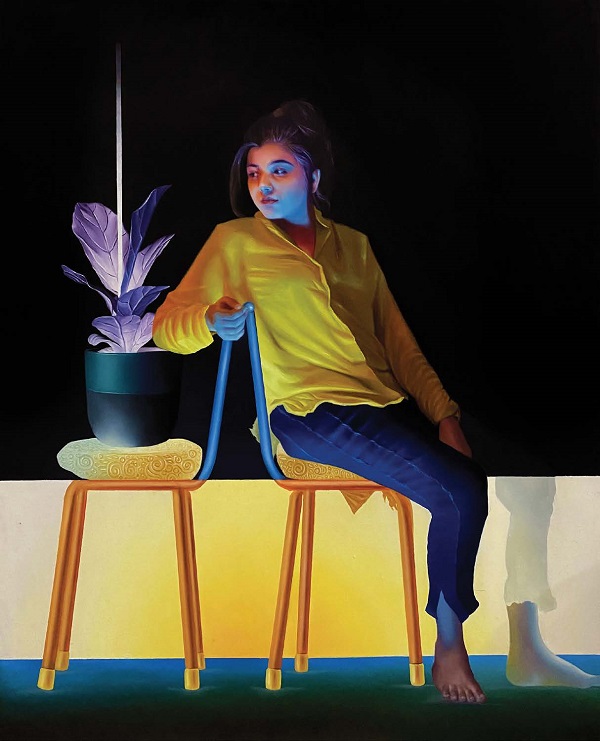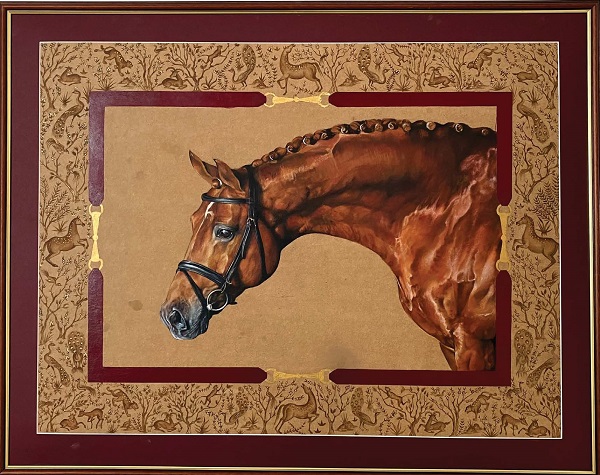
Written by: Nayha Jehangir Khan
Posted on: March 03, 2022 |  | 中文
| 中文
My best friend by MALIHA MATEEN
Imtisal Zafar is the Founder of the Pakistan Art Forum which has established itself as an exciting platform providing artist representation and art consultation. The gallery space is a new addition located in DHA Phase 8, Lahore, welcoming visitors to attend its recently opened exhibition titled “Stars of Tomorrow”, showcasing 22 emerging talents from all over Pakistan.
AB Rehman’s “Augmented Reality” series 7 paintings transcend into virtual in-motion compositions through scanning a QR code, and downloading a mobile application and viewing the paintings through the camera lens. The imagery uses computer circuits and hi-tech devices to interrupt classical and religious iconography. In the same room, we find the enchanting miniature works of Ali Gilani with a monochrome palette and intricate linework. The opposing visualizations of both artists create a strange tension in the room that feels immediate and surreal. The Mughal knights in “On the name of religion” and “Some unresolved sins”, appear to be in motion and colliding into one form.
The delicate stringing, the dabbing of soft strokes in Ayaz Memon's “Sounds of the Soul” paintings have a meditative and serene quality. The figuration depicts musicians in an interior space paired with grainy renditions of a rocking chair in the foreground of a warm yellow background and a potted plant merging into the delicately painted background. The artists capture a memory that feels like sound as the viewer can join in hoping to hear the music come through the canvas. Naira Sharjeel has a similar synthetic effect on the viewer with her weightless dreamy sculptural piece called “Ecdysis of glory”, which is shaped like a chandelier made out of polyester cotton fibers. Both artists capture a unique translucent light that feels nostalgic and allows the viewer to imagine that the work is fossilized.
The domesticated reality that Ramsah Imran in “Your package has arrived” has whimsy and chaos as the objects in their composition, appear to be kitchen utensils and appliances that carry an emotional message. The totem-like structure that Ramsah has created using Resin has familiar scenes of a telephone, teapot, iron, handles and switches that capture a portrait of the key elements of daily life. While Bisma has an opposite approach to placing objects perfectly in “Nine to Five”, her manicured kitchen has an unconscious figure that draws in the viewer to reflect on the emotional state of the subject.
The technical control of miniature painting requires patience and commitment to the art form. Taking their traditional training and merging it with high art references out of western art history, both artists Raza Bukhari and Fatima Khalid create contemporary painting collages. Raza’s “Whisper” has a recognizable Botticelli female figure with bronze Victorian hair braided meticulously, converging with an architectural motif creating an optical illusion. Fatima’s “Inside” series has muscular heroic Grecian Knights rendered as statues of marble pairs with earthy green landscape and geometry. On the other spectrum are the abandoned gardens bordered by dense foliage by Shahid Hussain Boni that appear to be otherworldly or from an older era, his works “Stepping Out” & “Same World, Different Joy” do not have figures but feel inhabited and occupied by a figurative presence.
The gallery had multiple rooms and corridors sections throughout the space. Imtisal Zafar has curated the artworks to be conversational, playing off each other creating an interesting walkthrough experience. Hira Asim’s large scale drawing works “The In Between”, “Boxed In” and “The Construct”, have sprawling compositions of linework paired next to Iqra Majid’s hypnotizing papercut sculptures that draw in the viewer. In Bazil Habib’s paintings, there is an exploration of line and symmetry that feels exciting and modern. All three artists are immersed in an introspective practice using shape, space and line work as their foundation.
A moment is highlighted by Shazma Arshad in “Shazma’s Dizzy Fever Day” where we see the artist in a self-portrait, her eyes closed and she is rendered in a soft pink palette with a smoothly blended warm glow emerging from her skin. Her hands are overlapping into the shape of a bird in flight or perhaps a butterfly, she seems to be relaxed and dreaming. Peering into the dreams of Maliha Mateen, her painting “Unavailable”, feels like an intimate moment but is purposely obscured, pushing the viewer to create their own conclusions as to what is happening to the protagonist. The clouds resting above the figure are painterly and welcoming, whereas the deathly blue skin of the figure feels nightmarish. There is a psychological tension in both the artist's paintings that feels relatable and explore the subconscious.
The process of mark-making can leave a profound effect on the artists, the repetition and control can be a meditative exercise. In Hassan Qureshi’s “Up in the smoke” series, the paintings are large scale with defined crisp lines jumbled, crossing and intersecting in the foreground while a softer collection of strokes rest in the background. On the other hand, in Isra Noman’s “Forest of spirit”, the waves of intricate linework feel like they are in motion, merging and separating like foliage in the wind. The artists explore the energy of linework in two completely different techniques and create their own unique visual language that feels emotional.
Other participating artists included Hamza Qazi, Komal Sulaman, Asif Hussain, Hina & Sehrish, Fatima Hussain and Irfan Abdulla. The exhibition showcases a variety of art forms and subject matters that indicates that the next generation of artists is interested in figuration and contemporary ideation of art-making. This is going to an annual exhibition hosted by Pakistan Art Forum in the hope that it will promote younger emerging artists, and will be a good forecast for potential art investment for art collectors and art enthusiasts.




You may also like: